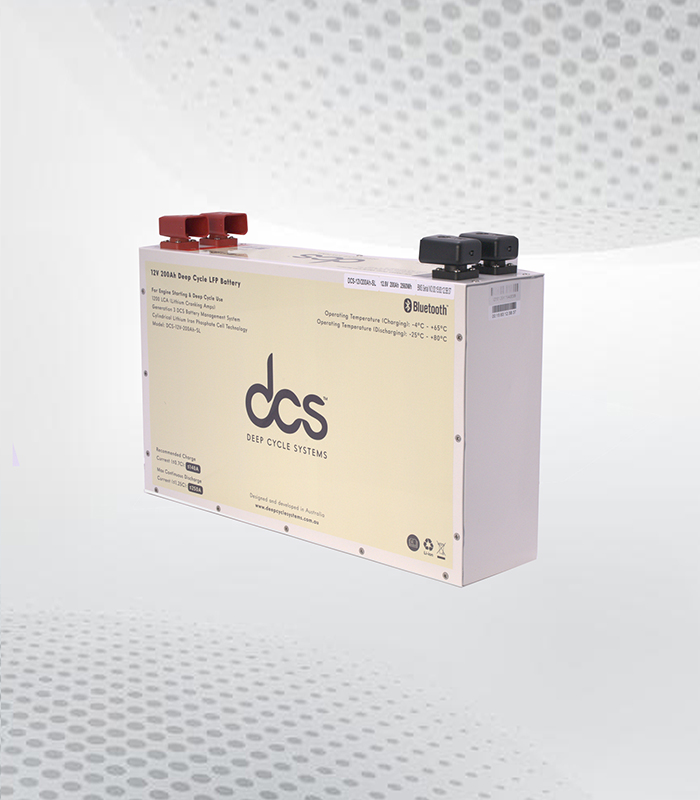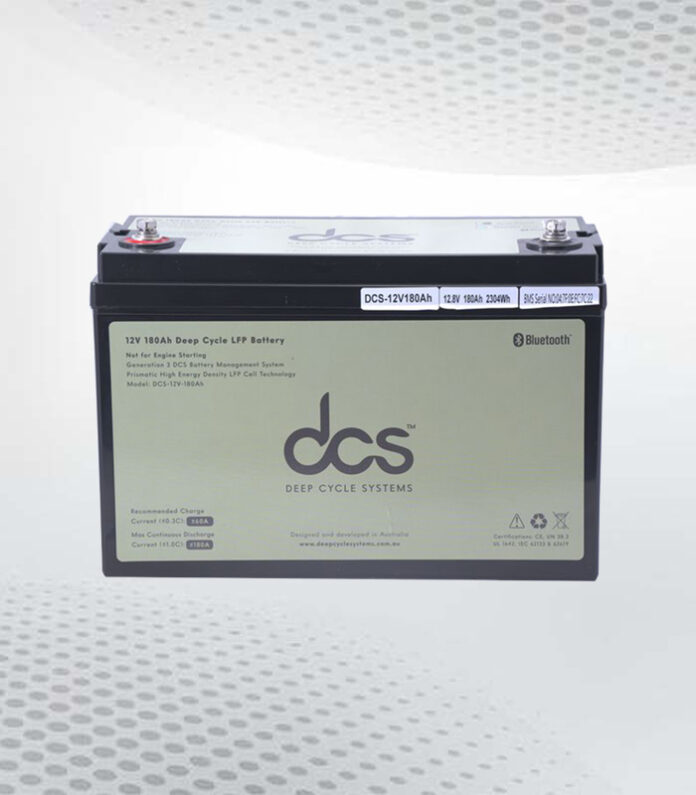When it comes to powering various applications efficiently and reliably, the choice of battery technology is crucial. Lithium deep cycle battery is one of the most popular and effective options today. These batteries offer a range of benefits that make them ideal for numerous applications, from renewable energy systems to recreational vehicles. This guide will explore everything you need to know about lithium deep-cycle batteries and how to choose the right one for your specific needs.
Understanding Lithium Deep-Cycle Battery Technology
Lithium deep-cycle batteries utilise lithium-ion technology to provide a stable and enduring power source. Unlike traditional batteries, they are designed for repeated discharging and recharging, ensuring consistent energy output over time. This makes them ideal for applications needing a reliable power supply, such as solar energy systems, marine uses, and off-grid solutions.
Their advanced technology offers better performance and efficiency, allowing for a longer lifespan and reduced maintenance compared to conventional batteries. Lithium deep-cycle batteries are known for their lightweight and compact design, making them a practical choice for various energy storage needs.
Advantages of Using Lithium Deep-Cycle Batteries
Lithium deep-cycle batteries offer numerous advantages, making them an increasingly popular choice for various applications, including renewable energy systems, electric vehicles, and recreational vehicles. One of the primary benefits is their high energy density, allowing them to store more energy in a smaller and lighter package compared to traditional lead-acid batteries. This feature enhances portability and frees up valuable space in applications where every inch counts.
Another significant advantage is their longer lifespan. Lithium deep-cycle batteries typically last three to five times longer than lead-acid batteries, reducing the need for frequent replacements. This longevity translates into lower overall costs in the long run, making them a more economical choice despite their higher initial price. Lithium batteries also offer faster charging capabilities, enabling quicker turnaround times between uses.
This is particularly beneficial for applications that rely on rapid energy replenishment, such as solar power systems that need to store energy quickly during the day for nighttime use. These batteries can handle deeper discharges without damaging the cells, allowing users to utilise more stored energy efficiently. Lithium deep-cycle batteries are more environmentally friendly, as they typically contain fewer toxic materials and can be recycled more efficiently than traditional batteries.
Applications and Uses of a Deep Cycle Battery Lithium
A deep cycle battery lithium is a versatile energy storage solution widely used across various applications due to its reliability and efficiency. One of the primary uses is in renewable energy systems, particularly solar power setups. These batteries store energy generated during sunny periods, allowing users to access power during nighttime or cloudy days, enhancing energy independence.
Another significant application of deep-cycle lithium batteries is in electric vehicles (EVs). These batteries provide the necessary power to propel cars over long distances while being lightweight and space-efficient compared to traditional lead-acid batteries. Their fast charging capabilities also make them ideal for modern EV designs.
In the marine industry, deep-cycle lithium batteries are commonly used to power boats and other watercraft. These batteries can handle deep discharges and rapid recharging, making them suitable for various onboard systems, such as navigation, lighting, and entertainment. Many recreational vehicles (RVs) use deep-cycle lithium batteries to power appliances, lights, and other electronics while off-grid camping or travelling. Their durability and performance in fluctuating temperatures make them reliable choices for outdoor adventures.
Factors to Consider When Choosing a Lithium Deep-Cycle Battery
When selecting a lithium deep-cycle battery, several critical factors should be considered to ensure optimal performance for your specific needs. The battery’s capacity is essential, typically measured in amp-hours (Ah). A higher capacity indicates more stored energy, allowing for more prolonged use between charges. It’s crucial to match the battery capacity with your power requirements, whether for solar energy systems, recreational vehicles, or marine applications. Consider the battery’s discharge rate.
Lithium deep-cycle batteries can handle deeper discharges than traditional lead-acid batteries, but it’s essential to understand the specific discharge limits to maximise battery life and efficiency. Check for a Battery Management System (BMS) integrated into the battery, as this feature helps prevent overcharging, overheating, and excessive discharging, enhancing overall safety and longevity. Charging speed is another significant factor; many lithium batteries can charge much faster than their lead-acid counterparts, which can be advantageous in applications requiring quick turnaround times.
Environmental conditions also play a role; consider how temperature fluctuations affect battery performance and ensure the battery can operate within your expected temperature range. Evaluate the warranty and manufacturer’s reputation. A solid warranty indicates confidence in the product’s durability, while reputable manufacturers typically offer better customer support and reliability, making these elements crucial in decision-making.
Installation and Maintenance Tips for Lithium Deep-Cycle Batteries
Proper installation and maintenance of lithium deep-cycle batteries are crucial for ensuring optimal performance and longevity. Here are some essential tips to follow:
Choose the Right Location
When installing a lithium deep-cycle battery, select an excellent, dry location with adequate ventilation. Avoid direct sunlight and extreme temperatures, which can affect battery performance and lifespan.
Secure Connections
Ensure that all connections are tight and secure. Use appropriate connectors and cables to minimise resistance. Loose connections can lead to overheating and reduced efficiency, compromising the battery’s performance.
Utilise a Compatible Charger
Always use a charger specifically designed for lithium batteries. An improper charger can lead to overcharging or undercharging, damaging the battery. An intelligent charger with a battery management system (BMS) will help maintain optimal charging conditions.
Monitor Battery Health
Regularly check the battery’s voltage and state of charge to ensure it operates within the recommended parameters. Most lithium deep-cycle batteries come with a BMS that provides real-time monitoring. Monitor these readings to catch any issues early.
Regular Maintenance Checks
Perform routine inspections to identify any signs of wear, corrosion, or damage. Clean the terminals and connections as needed to prevent buildup, which can hinder performance. Additionally, check the battery’s capacity periodically to ensure it functions correctly.
 Comparing Lithium Deep-Cycle Batteries to Other Types
Comparing Lithium Deep-Cycle Batteries to Other Types
Lithium deep-cycle batteries generally outperform other types, like lead-acid or AGM batteries, in several key areas. They offer greater efficiency, allowing for faster charging times and a higher depth of discharge. This means more of the battery’s capacity can be utilised without causing damage.
While they have a higher initial cost, their longevity and reduced need for maintenance often make them more cost-effective over time. Lithium deep-cycle batteries are significantly lighter and more compact, which is beneficial for applications where space and weight are critical. Their advanced technology also ensures better performance in various environmental conditions, making them versatile for multiple applications.
Safety Considerations for Lithium Deep-Cycle Batteries
Safety considerations for lithium deep-cycle batteries are crucial to ensuring their reliable and efficient use in various applications. While these batteries offer numerous advantages, including high energy density and long life, proper handling and installation are essential to mitigate risks associated with their use. One primary safety concern is the potential for thermal runaway, a phenomenon where a battery overheats and can ignite.
To minimise this risk, it is vital to use a battery management system (BMS) that monitors temperature, voltage, and current levels, ensuring the battery operates within safe parameters. Maintaining proper ventilation during charging and discharging is essential to prevent overheating. Proper installation also plays a significant role in safety. Users should ensure that connections are secure and corrosion-free to avoid short circuits.
Using the appropriate charger specifically designed for lithium batteries further enhances safety by preventing overcharging and ensuring the correct charging profile. Regular inspection and maintenance are necessary to identify any signs of damage, swelling, or leakage, which can indicate potential hazards. Educating users on safe handling practices, including using personal protective equipment (PPE) during installation or maintenance, can reduce the risk of accidents.
Tips for Maximising the Lifespan of Your Deep Cycle Lithium Battery
To maximise the lifespan of your deep cycle lithium battery, consider the following essential tips:
- Proper Charging: Always use a charger specifically designed for lithium batteries. Avoid overcharging, as it can lead to overheating and damage. Ideally, charge the battery to around 90-95% capacity for optimal longevity.
- Avoid Deep Discharging: Regularly discharging the battery below 20% can significantly shorten its lifespan. Try to keep the battery’s charge between 20% and 80% whenever possible.
- Temperature Management: Store and operate the battery in a moderate temperature range, ideally between 20°C to 25°C (68°F to 77°F). Extreme hot and cold temperatures can negatively affect performance and lifespan.
- Regular Maintenance: Periodically inspect the battery for signs of wear or damage. Clean the terminals and connections to prevent corrosion and ensure secure and efficient connections.
- Use a Battery Management System (BMS): If your battery doesn’t come with one, consider adding a BMS to monitor its performance. A BMS can protect against overcharging, deep discharging, and temperature fluctuations.
By following these tips, you can enhance the performance and longevity of your deep-cycle lithium battery, ensuring reliable power for your applications.
Conclusion
In conclusion, selecting the appropriate lithium deep-cycle battery is essential for optimising performance across various applications. Users can make informed decisions that enhance efficiency and reliability by considering factors such as capacity, discharge rates, and specific energy needs. As the demand for sustainable energy solutions continues to rise, understanding these key elements will empower individuals and businesses to harness the full potential of lithium deep-cycle batteries for their unique requirements.
FAQs
What are the benefits of using a lithium deep-cycle battery?
The primary benefits of using a lithium deep-cycle battery include a longer lifespan, typically 8 to 10 years, and greater energy density than lead-acid batteries. This means they can store more energy in a smaller, lighter package, which is advantageous in applications with critical weight and space.
How should a lithium deep-cycle battery be maintained?
Maintaining a lithium deep-cycle battery involves regular inspections for physical damage and ensuring clean, secure connections. Users should charge the battery with a compatible charger and avoid over-discharging, as it can harm the battery’s health. It’s also essential to store the battery in a cool, dry place to optimise performance.
Can a lithium deep cycle battery be used in off-grid applications?
Yes, a lithium deep cycle battery is well-suited for off-grid applications. It efficiently stores energy generated from renewable sources, such as solar panels, ensuring a reliable power supply even when the sun isn’t shining. This makes it an excellent choice for cabins, RVs, and remote installations.
What safety features should be considered with a lithium deep-cycle battery?
Safety features such as an integrated battery management system (BMS) are essential when choosing a lithium deep-cycle battery. The BMS monitors the battery’s voltage, temperature, and state of charge, preventing overcharging, overheating, and deep discharging. This enhances safety and extends the battery’s lifespan.
What applications benefit from a lithium deep-cycle battery?
A lithium deep-cycle battery is versatile and beneficial in various applications, including renewable energy systems, electric vehicles, recreational vehicles, and marine applications. Its efficiency and reliability make it ideal for powering modern energy solutions.
| Other Good Articles to Read |
| Blogs-Nation |
| Blogs-Peoples |
| Bryan Smith Blogs |
| intellect blogs |
| the fault in our blogs |
| blogs eu |
| oz forums |
| recruitment blogs |
| zet blogs |
| id blogs |
| Blog Studio legale |
| blogs map |
| Related Business Listings |
| Contact Directory |
| Local Business Profiles |

